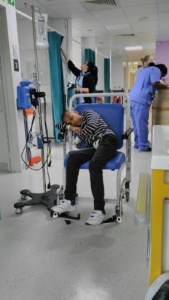Matthew Akinmuleya, 10, from London, was diagnosed with sickle cell disease at birth and had his first pain crisis at six months old. Since his diagnosis he has required a blood transfusion every month, which means he is likely to have received over 100 transfusions. He is still very ill and in the last six months, he has been admitted to hospital every month.

Matthew’s mum, Omotolani, explains: “It’s very stressful and very upsetting seeing your child being in pain every day. He has no break. The hospital tried to see if he could manage without blood transfusions, but he had so much pain, A&E admissions, IV and oral morphine. Nothing could help. The blood he receives makes a huge difference. In the first two weeks after his transfusion he is like a normal ten-year-old. He has energy and is able to go to school. But after three weeks, he starts to look pale, jaundiced, tired and pain takes over. In the week before his transfusion, he will be in severe pain and often admitted to hospital. As a mother and carer, I really appreciate all of those who donate. My child would not have survived without you. We need the help for our children to help them live. Without this blood, his story would be so different.”

NHS Blood and Transplant has launched an urgent appeal for more black donors to come forward to help them meet the demand for blood required by sickle cell patients. The appeal has been launched after a 75% increase in the amount of Ro blood – a special subtype which is most common in black people – has been issued to hospitals between 2014 – 2016, with expectations that demand will grow further. A high proportion of this blood will be used to treat sickle cell disease, the most common and fastest growing genetic disorder in the UK.
NHS Blood and Transplant estimate that a further 40,000 new black donors are still needed in order to meet growing demand. In the UK, 15,000 people have sickle cell disease and over 300 babies are born each year with the condition. The condition can cause extreme pain, life-threatening infections and other complications such as stroke or loss of vision.
Advances in the treatment of sickle cell disease also means that patients with sickle cell disease are living longer and the demand for transfusions is higher than ever before. Yet, to get the best treatment, patients need blood which is closely matched. This is most likely to come from a donor of the same ethnicity. However, currently only 1% of blood donors in England are black.
If patients do not receive blood which is has a close enough match, then there is a risk that they can suffer reactions to the donated blood or develop additional antibodies which make it harder to find matching blood in the future.
Mike Stredder, Director of Blood Donation, NHS Blood and Transplant, says: “Every day, blood donors across the country make a difference; saving people whose lives depend on blood. Whether it is patients receiving treatment for cancer, blood disorders, after accidents, surgery or during childbirth. But we need to ensure that we have the right mix of donors and blood types, to help meet the needs of all patients who need life-saving treatment, especially those with conditions like sickle cell disease who require blood which is more closely matched than by group alone.
“In recent weeks, we have been overwhelmed by the numbers of people stepping forward and wanting to donate and show their support for those affected by recent tragic events. Thankfully, due to the loyalty of our regular donors, our emergency stocks have proven to be strong and sufficient, but we still need to ensure that we can be there every day, for every patient who needs us.
“Don’t worry if you’ve never given blood before and don’t know what blood group you are – you find out shortly after your first donation. What’s important is that you register as a donor and book your first appointment to donate. By saying ‘I’m there’, you can save the life of someone else, while going about yours.”
NHS Blood and Transplant is urging people to say #ImThere and start saving lives by registering as new blood donors. To register or book an appointment visit www.blood.co.uk, call 0300 123 23 23 or search for ‘NHS Give Blood’ app.
In general, as long as you are fit and healthy, weigh over 7 stone 12lbs (50kg) and are aged between 17 and 66 (up to 70 if you have given blood before) you should be able to give blood. If you are over 70, you need to have given blood in the last two years to continue donating.
Follow us on twitter:@AfricanVoice2









